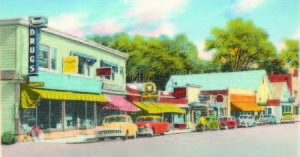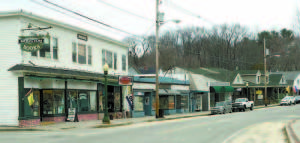Historic eligibility in question on bookstore facade grant

This colorized postcard photo taken from the Remember in Bridgton Facebook page shows the Bridgton Books building at left, as it was around the late 1930s or early 1940s. Questions arose at Tuesday’s Bridgton Selectmen’s meeting about the historic eligibility of the Main Street building to receive a $9,500 matching façade grant under the Community Development Block Grant program administered through Cumberland County.
By Gail Geraghty
Staff Writer
Last-minute questions have arisen over whether the Bridgton Books building on Main Street has enough historical significance to qualify for a Community Development Block Grant from the town.
Planning and Economic Development Director Anne Krieg told Bridgton Selectmen Tuesday that Cumberland County CBDG officials raised the question with her last week, when turning over the final CDBG project list as decided by the board at their March 8 meeting. Krieg said county officials told her that the building, owned by Justin and Pam Ward, needs to be either listed on or eligible for listing on the National Register of Historic Places in order to receive the $9,500 in matching funds the Wards have requested for façade improvements.
She said both she and the county are now researching the issue, but wanted to make the board’s grant approval for the bookstore provisional on establishing the building’s historic status. If it turns out it is not eligible, the funds should go towards a new bathhouse at the Salmon Point Campground, Krieg recommended.
The deadline for resolving the question and providing a final funding list to the county is Friday, April 1.
Selectmen agreed to make the funding decision provisional, but several members questioned why the historic status issue was still unresolved at this late date. Krieg also asked for $2,020 to be shifted back to the recreation summer camp program because of the need to spend those funds before June 30.
“This is literally a shell game,†a frustrated Selectman Paul Hoyt said. The town’s two food pantries would still receive the $5,000 approved earlier.
“I’d be lying if I didn’t say I was curious†why there were still outstanding issues regarding the bookstore’s façade grant funding, added Selectman Greg Watkins. “Here we are, still at the last moment (making decisions), which is exactly where we didn’t want to be.â€
The board vowed last year to start the CDBG decision-making process earlier so there wouldn’t be a repeat of last year’s series of last-minute adjustments and changes. The Community Development Committee met four times this go-round to review eligible projects, and then selectmen followed up with four separate discussions of their own.
Krieg said county officials do allow private businesses to receive façade grant help, but only if two conditions can be met: either the building is historical, or it qualifies on the basis of so-called “slum and blight†conditions. In the latter case, health and safety issues must be present, and that is simply not the case with the Bridgton Books building.
The building’s historic status is less clear-cut, however. In the 2004 Bridgton Historical Society publication, Rediscovering Bridgton’s Main Street, the building, located at the corner of Nulty and Main Street in what is known as Post Office Square, is known as the March Building and has a rich history of prior retail uses dating back to the 1920s. Its appearance is essentially unchanged from that era.
Kreig did not offer specifics as to what historic criteria must be met under CDBG façade grant rules, but noted that other Main Street buildings have qualified in the past for façade grants, including the J. Décor building on Main Hill and the Gallinari House now owned by the Rufus Porter Museum.
Selectman Bob McHatton agreed that the board needed to become more educated about CDBG project rules in succeeding years, and suggested inviting CDBG county officials to meet with them in a workshop prior to starting next year’s decision-making process. Selectman Chairman Bernie King said a meeting for that purpose has already been scheduled for September.
After a confusing initial vote rejected the provisional funding approval for the bookstore (the vote was 2-3, with members Ken Murphy, King and Watkins opposed), Murphy asked for reconsideration of the approval, and that motion passed by a vote of 3-2, with King and Watkins opposed.


